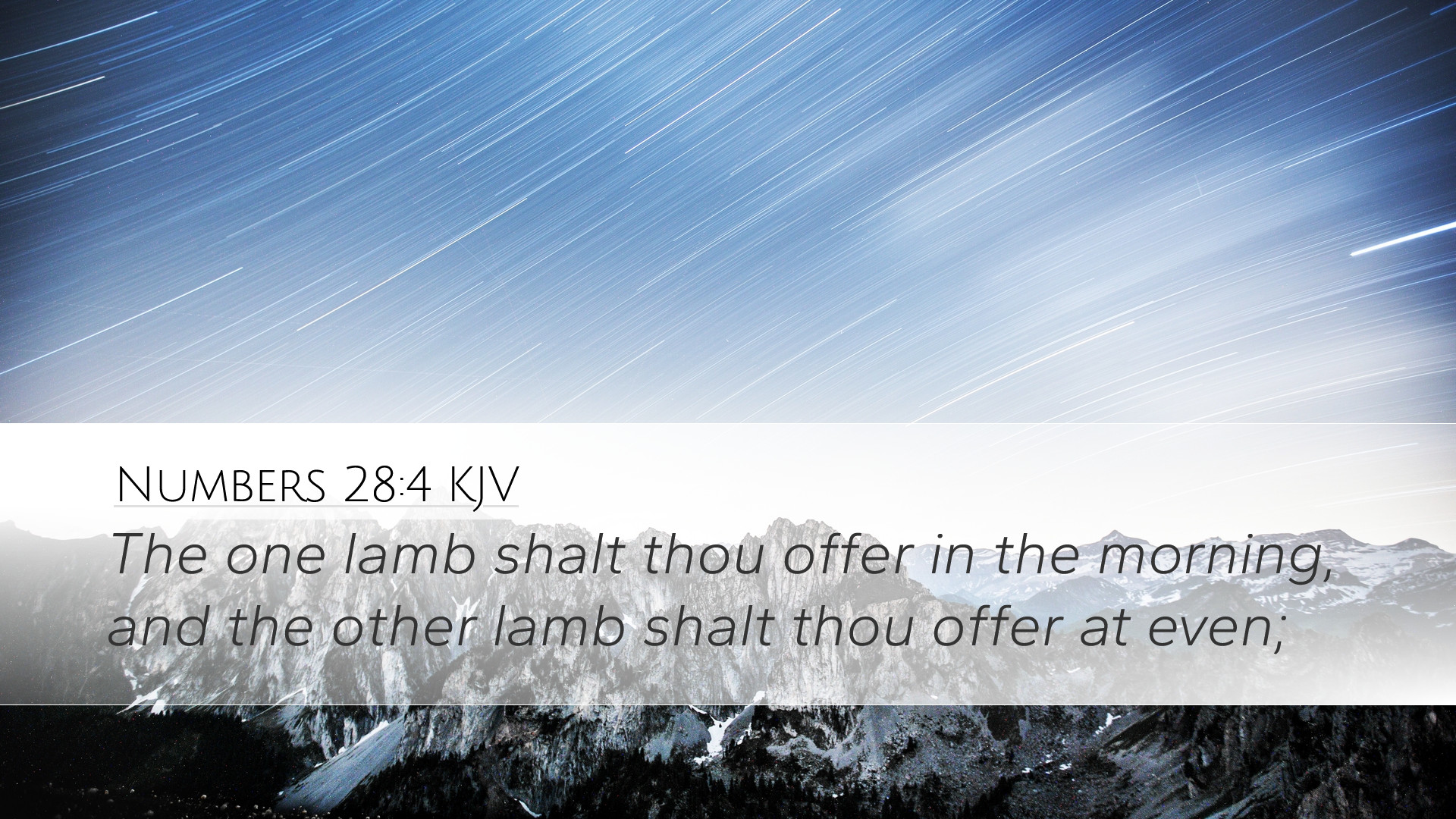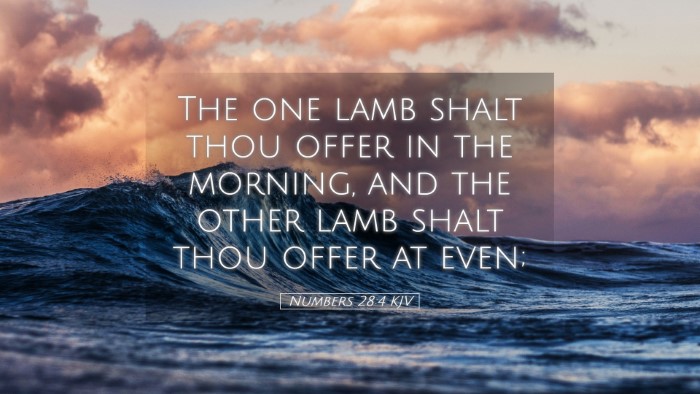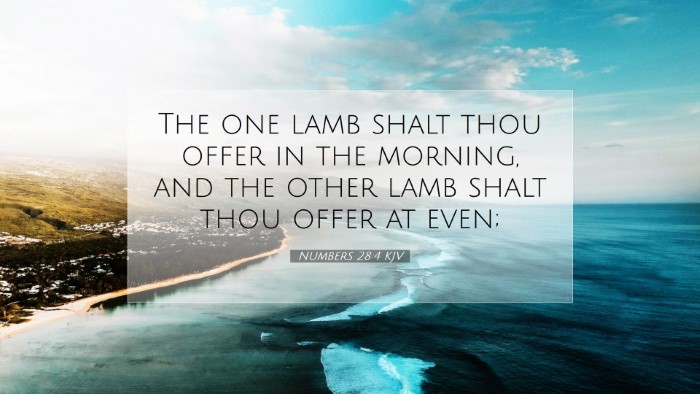Commentary on Numbers 28:4
Verse: Numbers 28:4 – "And the one lamb shalt thou offer in the morning, and the other lamb shalt thou offer at even."
Introduction
This verse falls within the instructions regarding the offerings that the Israelites were to present regularly. It reinforces the significance of daily sacrifices, symbolizing a continual acknowledgment of God's presence among His people.
The Importance of Regular Sacrifice
Matthew Henry's Commentary: Henry emphasizes that the daily sacrifices point to the necessity of a continual relationship with God. Just as the Israelites were to offer lambs in the morning and evening, believers today are encouraged to present themselves before God daily, seeking His guidance and maintaining fellowship.
Albert Barnes' Notes: Barnes highlights that these sacrifices were a daily reminder of the people's dependence on God. These rituals can be compared to the practices within the Christian tradition, such as prayer and worship, which serve as regular offerings of ourselves to God.
Adam Clarke's Commentary: Clarke provides a historical context, noting that these offerings were integral to the temple worship and reflected the covenant relationship between God and Israel. They were a means for the people to express their thankfulness and reliance on divine mercy.
The Symbolism of the Lambs
The choice of lambs for sacrifice carries profound meaning. The lamb, often associated with innocence and purity, foreshadows Jesus Christ, the Lamb of God, who takes away the sins of the world.
Matthew Henry: He points out that the lamb signifies not only innocence but also a substitutionary atonement, illustrating how God’s provision is paramount for redemption.
Albert Barnes: Barnes links the sacrificial lambs to the Christian understanding of Christ’s sacrifice. Just as the daily offerings were required, the ultimate sacrifice of Christ underscores the necessity of His atonement in the believer's life.
Adam Clarke: Clarke further elaborates on the prophetic nature of the lamb. He connects the ritual's continuity with the unfolding plan of God’s redemption through Christ, making the daily sacrifice a vivid reminder of the coming Messiah.
The Time of Offering
The morning and evening offerings symbolize a full day of devotion and commitment to God, representing the beginning and the end of each day.
Matthew Henry: He remarks that offering in the morning signifies starting the day with God, invoking His blessings and guidance. Evening offerings are reminders of reflection and gratitude for the day gone by.
Albert Barnes: Barnes emphasizes the theological implication of these times. Morning represents new mercies and strength for the day, while evening is an opportunity for repentance and thankfulness.
Adam Clarke: Clarke interprets the two times as an invitation for the Israelites to recognize God's sovereignty in every part of their lives—beginning with the dawn of a new day and concluding with evening prayers.
The Purpose of the Offerings
The offerings outlined in this verse serve various interlinked purposes, including atonement, thanksgiving, and dedication.
Matthew Henry: The offerings are an acknowledgment of God’s provision and a means of atonement for sin. They serve as a reminder that approaching God requires recognition of His holiness and our sins.
Albert Barnes: Barnes discusses the dual purpose of the offerings—praise and petition. These rituals connect the community with God, fostering a continual dependence on His grace.
Adam Clarke: Clarke notes that the offerings were not only an appeal for mercy but also an act of devotion. They reflect the heart of worship, which seeks to honor and glorify God in every circumstance.
Theological Reflections
From this passage, it becomes evident that the offerings connect deeply with Christian theology, particularly relating to worship and sacrifice.
- Continuity of Worship: Both the Old and New Testament believers are called to worship God regularly, establishing habits of prayer and devotion.
- Christ as the Fulfillment: The lambs represent the ultimate sacrifice of Christ, who provides believers access to God.
- Daily Commitment: The routine of morning and evening sacrifices reflects the importance of devoting all parts of life to God.
Modern Application
In the context of contemporary faith practice, this verse calls believers to consider how they can similarly structure their lives around God’s presence.
- Establishing a routine of daily devotions — both in the morning for commitment and in the evening for reflection and gratitude.
- Recognizing the significance of Christ’s sacrifice in both personal and communal worship.
- Emphasizing the importance of worship in all aspects of life, encouraging an attitude of thankfulness and reliance on God's provision.
Conclusion
Numbers 28:4 serves as a critical reminder for all believers of the value of daily sacrifice and worship. By studying the insights from Matthew Henry, Albert Barnes, and Adam Clarke, we are encouraged to deepen our relationship with God through regular practices of devotion and acknowledgment of Christ's sacrifice. This daily rhythm of offering leads to a fuller understanding of God’s presence and ongoing grace in our lives.


